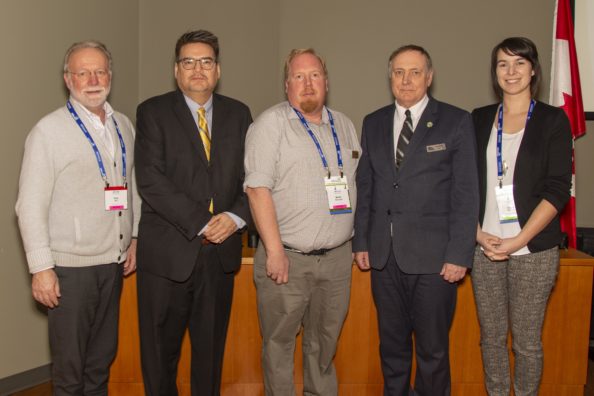
Gary Bull, Douglas White, Merlin Blackwell, Gary Foster and Sharie Minions
Forest Minister Doug Donaldson said the future of forest management in BC will involve communities having more control over decisions regarding local resources. But how important is that and how’s it going so far? Moderator Gary Bull, UBC Forestry Professor had no problem eliciting ‘animated’ responses from a panel of BC mayors and a First Nations community leader.
Gary Foster, Mayor of Fort Nelson spoke of the foreclosures and bankruptcies following the closure of two sawmills and collapse of their oil and gas sector. Key to their recovery was the establishment of partnerships with local First Nations, the securing of a community forest, and a reinvigorated public with increased say on local influences. Clearwater mayor Merlin Blackwell spoke of similar challenges and solutions but also the ongoing uncertainty and frustration on waiting for government to decide on Canfor’s tenure sale to Interfor. Sharie Minions, Mayor of Port Alberni spoke passionately of their communities history and attachment to the sector but also the challenges—such as dealing with watershed issues when the area is dominated by private forest land interests, but also supporting opportunities—such as the San Group’s new mills that diversify the products produced from the forest.
Wrapping up the panel discussion was a talk by Douglas White III, a spokesperson with Coast Salish First Nation and director for the Centre for Pre-Confederation Treaties and Reconciliation. As his title might suggest, White opined on the ‘defining moment’ the recent federal appeals court represents in Aboriginal reconciliation. In White’s view, the decision ignores all the previous rulings on Aboriginal title, rendering the reconciliation process ‘broken or dead’. Given the import of the First Nations historic and future role in BC’s forest economy—as noted by all the mayors—the urgency of action was paramount.